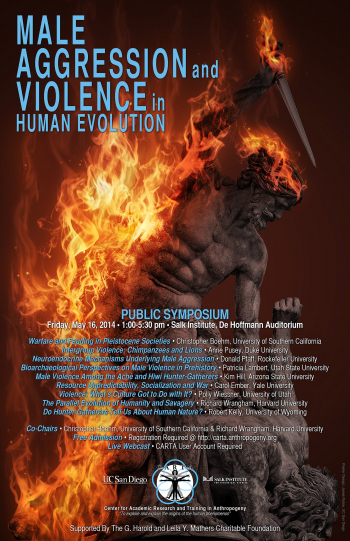Male Aggression and Violence in Human Evolution
Christopher Boehm, University of Southern California
Richard Wrangham, Harvard University
In the last few decades, new sources of evidence have continued to indicate that male violence has played an important role in shaping behavior in the human lineage. The frequency and nature of such violence varies widely among populations and over time raises questions about the factors responsible for the variation. In the past, much controversy and even some acrimonious debate has occurred over the question of whether humans lived in a state of ancestral peace. The aim of this symposium is to set aside such theories and debates and take a fresh look at the causes and consequences of variation in aggression, both between and within species. The focus will be on speakers who can critically examine and represent the available evidence from multiple sources, including comparative ethology, ethnology, archaeology, political science, and evolutionary neuroscience. While the symposium may not come to any definitive conclusions, it should allow for the best interpretation of the current evidence, and help suggest research agendas for the future.
Media for each talk can be played by clicking on icons in the table below, or by clicking on the individual talk titles below and then the attachment file at the bottom of the page.
| Speakers | Media | Session |
|---|---|---|
 Pascal Gagneux  Richard Wrangham |
|
Welcome and Opening Remarks |
 Christopher Boehm |
|
Warfare and Feuding in Pleistocene Societies Today’s hunter-gatherers are used to portray likely patterns of male aggression among culturally-modern foragers in the Late Pleistocene epoch. Patterns of aggressive behavior are considered at three levels: within groups between groups of the same ethnicity, and between groups that consider one another strangers. |
 Anne Pusey |
|
Intergroup Violence: Chimpanzees and Lions Some mammals live in permanent social groups that occupy and aggressively defend the same area for generations. Like many mammals, female lions generally remain for life in their natal pride. Males leave their pride before breeding and attempt to take over another pride by fighting and evicting the resident males, evicting subadults, and killing cubs. Infanticide hastens the resident females’ return to sexual receptivity, allowing the new males to sire their own cubs more quickly. Once resident... read more |
 Donald Pfaff |
|
Neuroendocrine Mechanisms Underlying Male Aggression In free-living animals, aggressive behaviors by males often serve to maintain resources the male will need to attract and protect females. In many human cultures, the frequency of murders of males by unrelated males depends on age. Young men between the ages of approximately 13 and 20 tend to be the most violent. That is, as soon as testosterone arrives in significant concentrations in the brain and for years thereafter, violent aggression is more likely. In this public symposium I will address... read more |
 Patricia Lambert |
|
Bioarchaeological Perspectives on Male Violence in Prehistory This talk examines the bioarchaeological evidence for violence and warfare in ancient California. Violent injuries in human skeletal remains provide one of the most compelling lines of evidence for violent conflict in prehistory. Injuries recorded in bodies, whether from clubs, spears, arrows or other weapons, enable the identification of victims and, by logical extension, the participants in physical acts of aggression. Using these data it is possible to reconstruct levels and types of... read more |
 Kim Hill |
|
Male Violence Among Ache´ and Hiwi Hunter-Gatherers In order to understand how warfare and violence have shaped the natural history of our species, and perhaps favored adaptations that respond to this important life threat, we need to document what types of violence were common in our ancestors and what were the levels of violent death in the past. Archeology has allowed us to detect some fraction of violent deaths in ancient people, and assign a rough percentage of all deaths due to violence. Observation on modern hunter-gatherers, who live... read more |
 Carol Ember |
|
Resource Unpredictability, Socialization and War Until we understand the conditions that increase or decrease the likelihood of conflict, it is difficult to imagine how we would create a more peaceful world that many yearn for. The research I describe today is the culmination of decades-long research that tested a variety of theories about warfare and other forms of violence in a sample of 186 societies. Many of the theories of warfare assumed to be plausible fell short, such as the idea that war becomes more likely with agriculture and... read more |
 Polly Wiessner |
|
Violence: What's Culture Got to Do with It? All humans have the capacity for aggression and reconciliation. However, it is cultural institutions that harness aggression by shaping cognition, corresponding emotions and defining appropriate responses. A central question then arises: How do different societies devise cultural institutions to channel aggression and how these institutions work to their benefit or detriment in the long run? After all, management of violence has been a crucial factor in the rise and fall of groups throughout... read more |
 Richard Wrangham |
|
The Parallel Evolution of Humanity and Savagery Human male violence is paradoxical. On the one hand within social groups there is a strong tendency for avoidance of direct conflicts such that confrontations between angry individuals or groups normally end without serious harm. On the other hand our species has a consistent history of intense deliberate violence, ranging from planned homicides and low-level and long-lasting warfare among nomadic hunter-gatherers to massive intermittent conflicts among states. A common interpretation of this... read more |
 Robert Kelly |
|
Do Hunter-Gatherers Tell Us About Human Nature? When many people want to discover the core of human nature, they turn to those people who allegedly are or represent humanity’s original condition, hunter-gatherers. Do hunter-gatherers have a special ability to reveal human nature? We will examine this question by focusing on the issue of violence: do hunter-gatherers say that we are inherently predisposed to violence, or to peaceful cooperation? Trying to answer this question raises a more general one: is there such a thing as human nature? |
 Christopher Boehm  Richard Wrangham |
|
Wrap Up, Question and Answer, and Closing Remarks |
| Attachment | Size |
|---|---|
| 275.85 KB | |
| 201.65 KB | |
| 14.07 MB | |
| 790.12 KB |
If you enjoy this event, please consider supporting CARTA's quest to explore and explain the human phenomenon.


